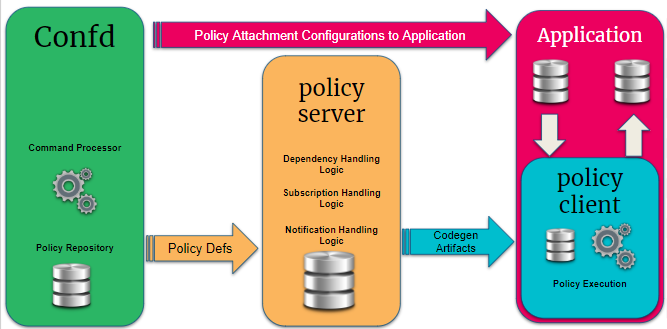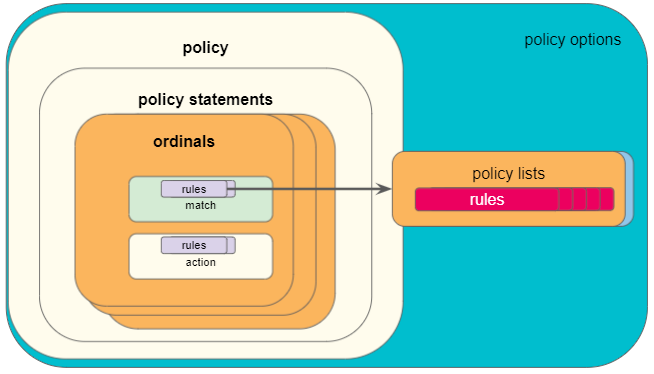Introduction
Policies are set of rules that allow to control and modify the behavior of routing protocols such as BGP and IS-IS. The policy framework is generic, it serves multiple purposes and applications. Policies are first created using a common policy configuration, and then applied by attaching them to an application like a protocol.
Policy Components
In RtBrick Full Stack, the policy implementation consists of 4 sub-components:
-
Policy Repository
-
Command Processing Module
-
Policy Server, the policy generation and relationship management component
-
Policy Client, the policy enforcement component

Policy Repository
The policy repository contains all tables related to policy and associated list of match criteria.
Command Processing Module
The command processing module is part of the configuration daemon (confd), and it handles user interaction with the policy module. This is the back-end of the Command Line Interface (CLI) and JSON configuration that support the policy configurations.
This module maps the user-defined configuration into the back-end policy object, which is used by the execution engine (after verification), and it ensures that the policy can be correctly executed. This module relays the user intent via related BDS tables to the policy server.
Policy Server
The policy server is a server component that manages all policy rules in the various policy tables and also code generation of the policies.
The following are functionalities of the policy server:
-
Parses the objects in the policy tables, and is an execution engine that generates the code to build the policy rules for evaluation, the relationship between various objects, and relays the intent to the evaluation engine.
-
Maintains relationships between various policy constructs such as policy statements, rules, ordinals and lists.
-
Tracks the attachment points so that when policies are modified, the appropriate clients are notified with the relevant new policies.
-
Flattens the various relationships and generates a notification table that the clients subscribe to obtain notification based on specific interest groups.
-
Uses dependency table relationships to generate jobs to trigger code generation for various policy components.
-
On code generation, the policy server updates a notification table that maintains the mapping between the policy server and the client interest groups. The notification table is a single point for the dissemination of information so that it can generate notifications for clients depending on their subscriptions for policy of interest.
-
Policy server notification is generated for the policy clients. A notification is received from the notification table with metadata information that notifies the client if this is a new version of the policy or the original version of the policy. The client uses this information to enforce the policy evaluation and to decide on the version of the policy rule that should be used.
Policy Client
The policy client is a shared library component that a client daemon like BGP, IS-IS, OSPF etc. links to. This is the component that performs policy enforcement. It performs the following tasks:
-
Links with client daemons like BGP, IS-IS, OSPF.
-
Contains a listener that gets notifications on the availability of a new policy rule that is generated by the policy server.
-
Evaluates the compiled rule and if there are any listeners/ interests, then notifies the components within the client daemon.
-
Evaluates any policy configurations on the client daemon and invokes policy processing in response.
Tables and Subscriptions
The table below shows the various tables and their sharing across various policy components.
Confd |
global.policy.list.config global.policy.list.entry.config global.policy.match.rules.config global.policy.statement.config global.policy.ordinal.config global.policy.mapping.list global.policy.mapping.rules |
Policy Statement is composed of one or more policy terms. Each term has a match action criteria. In the match and action criteria either a single element or a list of elements are compared and actions are taken. The actions include accept, deny, flow-control etc. |
policy.server |
global.policy.dependency global.<bds_name>.policy.subscription global.<bds_name>.policy.notification |
Policy Server subscribes to all the tables from |
policy.client |
global.<bds_name>.policy.shared.object.cache global.<bds_name>.policy.subscription global.<bds_name>.policy.context |
Subscribes to code generation notifications, application context and maintains cache of subscribed .so |
Policy Building Blocks
The figure below shows the building blocks of a policy.

Statements
A policy is defined by a policy statement. A policy statement is a compound block of policy definition that consists of one or more set of rules called ordinals. A policy statement is exercised in the order defined. The statement name is a globally unique string that is used to identify the policy, and used by the applications.
Ordinals
A policy ordinal is the smallest block to represent a user policy intent and consists of rules for match and action blocks. The match blocks can either define single independent elements like AS path, IP prefix, IP addresses, community, etc., or a list of the elements maintained in a different table.
-
An ordinal must be a unique number within the scope of a statement which determines the order of the term execution within a policy statement.
-
If no ordinal exist or configured, and if the policy is used, then all routes or objects will be denied.
-
A match logic is defined per ordinal. In case of multiple match rules, it defines if all rules (
and), or any of the rules (or) have to match.
Match Rules
Match rules define criteria to evaluate and select routes or other objects to which the policy is applied. One or more match rules compose a match block.
-
If the match block results in a successful match ("true"), the corresponding action block will executed.
-
If the match block result is unsuccessful ("false"), the action block will not be executed, and the next ordinal will be processed.
-
If there is no match block, the action block will be executed.
In case of multiple match rules, the behaviour depends on the configured match logic:
-
If the match logic is
or, the match block result will be succcessful ("true") if any one rule matches. Otherwise, by default it is "false". -
If the match logic is
and, the match block result will be successful ("true") if all rules match. Otherwise it is "false".
A match rule can refer to a single discrete value, or a list. A policy list is configured separately and referenced from the policy statement. In case of a list match, the behaviour is as follows:
-
If any of the list entries matches the configured value, the match block result will be succcessful ("true"). Otherwise it is "false".
-
If the list is defined but empty, the match rule result will be unsuccessful ("false").
Action Rules
Action rules define operations like return-permit or return-deny, or flow control commands like goto-next-ordinal. The action block will be executed if there is a successful match. Otherwise, the next ordinal is processed. The action block can contain one or multiple action rules. In case of multiple action rules, all actions will be applied. The rules are executed in the order of the rule numbers. If there is any termination action, the rules afterwards are not executed anymore.
The action block is optional. The implicit default action is return-eny.
Lists
A policy list is a list of values that can be referenced by a match rule in a policy statement. If you have a number of values like for example route prefixes, it is more efficient to refer to a policy list instead of creating one match rule per prefix.
Policy lists are configured separately and can thereby be maintained more easily. Besides, policy lists can be referenced by multiple policy statements.
Conditions
Policy conditions are configured separately, and can be used as an additional option in policy statements. A policy rule (ordinal) will only be executed if the condition is true. Conditional policies allow to make policy execution depended on certain states of the system, for example:
-
Protocol neighbor states
-
Presence or absence of a specific route and/or path attribute
-
Number of routes in a routing table
One condition is supported per ordinal. A single condition can be attached to multiple policies.
Attachment Points
Policies define set of rules that can be used for various purposes by various applications. Once policies have been created, they need to be applied in order to take effect. Attachment points describe the specific applications and processes to which policies can be applied. RBFS currently supports the following policy attachment points:
-
Instance import/export - Policies attached to an instance at the address family level allow to control which routes will be imported into the instance and exported from the instance by BGP. Such import and export policies are commonly used with BGP L3VPNs.
-
BGP peer group import/export - Policies attached to BGP peer groups allow to define which routes will be advertised to and accepted from BGP peers. You can attach policies to both instances or peer groups to define the import and export behaviour. You can also combine both attachment points, for example if some policy rules apply generically to the instance and some other rules specifically to a peer or peer group.
-
BGP redistribution - You can attach policies to BGP redistribution to define which routes will be redistributed into the BGP process. This is useful if you would like to redistribute only a sub-set of a type of routes.
-
IS-IS redistribution - Policies can be attached to IS-IS redistribution to control which routes will be redistributed into the IS-IS process.
-
IGMP group filtering - You can apply policies to IGMP interface profiles. Such policies act as IGMP group filters when receiving IGMP Membership Report messages.
-
IGMP SSM-mapping - Policies are further used to define SSM mapping. SSM mapping policies attached to IGMP interface profiles define how to translate IGMPv2 (*,G) to IGMPv3 (S,G) Reports.
Policy Behaviour
The default behaviour of a policy is deny. This means, if a route or any other object is subject to a policy, by default it will be marked as deny. For example in case of an import policy, it will not be imported. A policy will permit an object, for example import a route, if the route or object successfully matches the match rules, and if there is an action rule with a permit. In addition, further operations like modifying route attributes might be executed.
Policy ordinals are executed in the order of the ordinal numbers.
-
If an ordinal results in a terminating action like
permitordeny, the policy processing is completed for the respective object. Subsequent ordinals will not be processed. -
If an ordinal does not result in a match, the next ordinal is processed.
There might be situations in which a policy configuration is not complete or not valid. In particular, a policy may contain a match or action type not supported by an attachment point. For example, the ipv4-mcast-group type is not supported by BGP or IS-IS. The following list summarizes the behaviour for such invalid scenarios:
-
If a policy is attached but does not exist, all routes or objects will be denied.
-
If a policy contains only statements, or only statements and ordinals, but no match and action block, it will deny all.
-
If a match or action type is not supported by the attachment point, the policy will ignore the unsupported rule and process only the supported rules. For any ignored rule, the default
denyis not impacted. The behaviour will be the same as if the unsupported rule does not exist.